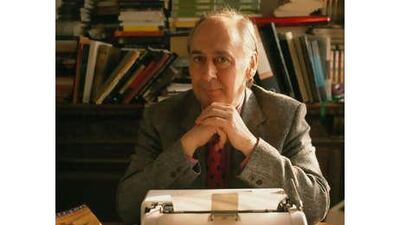The news last week that the British Library has acquired the archives of the late dystopian writer JG Ballard came as quite a shock to dedicated followers of the author of Empire of the Sun. After all, when Ballard was asked in 1982 whether he had a collection of first drafts, notebooks or letters, his answer was clear: "There are no Ballard archives." One of the greatest authors of the 20th century was, in hindsight, being mischievous. Too right: it's the kind of question asked of an author in his twilight years, not a 52-year-old who hadn't even written his defining novel yet. Fast forward to 2010, and the excitement surrounding the 15 large storage boxes of material he assiduously amassed over the years not only suggests Ballard knew they would have a value but that keeping archives has become big business.
Not that the interesting curios around Ballard's books shouldn't be preserved for posterity: his early life in a Japanese prisoner of war camp - detailed in letters to fellow internees and even a map he drew as a 12-year-old - is fascinating stuff. And better an archive is retained and maintained in its entirety by a not-for-profit organisation such as the British Library. But it's also a rare occurrence. Increasingly, the libraries and archives of famous writers are being purchased by wealthy American universities. Fifteen years ago, the sale of Graham Greene's archive for £1million (Dh5.3m) raised eyebrows - many expected a British institution would raise the money. But Boston College had the cash in hand, Greene's surviving sister needed to finance her medical bills, and the archive of the Brighton Rock writer crossed the Atlantic.
Then, in 2003, Emory University in Atlanta bought the archive of the Poet Laureate Ted Hughes for $600,000 (Dh2,203,800). Such sales aren't always posthumous, either. The triple Booker nominee Julian Barnes sold his papers to the University of Texas for $200,000. What, then, do universities find so alluring about the collected thoughts of these authors? After all, it's surely the books that are the lasting legacy, not the notes the writers make in the margins of their manuscripts? The answer is probably hidden in one of the most high-profile acquisitions of recent times: the archive of David Foster Wallace.
Perhaps the interest in the accoutrements surrounding Wallace's work and, in particular, his innovative, energetic postmodern satire Infinite Jest, has been heightened by the circumstances surrounding his death. Wallace committed suicide in 2008 and his agent Bonnie Nadell hit the nail on the head when she called Wallace's archives a "window into his mind". The papers reveal a writer who would painstakingly edit and re-edit - in different colours - until he was sure he had the right word for each sentence. They uncover the author's love of language which, perhaps, makes the reader reappraise his talent. As Nadell says: "I know there were people who felt David was too fast, clever and undisciplined. Yet anyone reading through his notes to himself will see how scrupulous he was."
Ballard's archive, too, is full of drafts scribbled over, rewritten and reworked. We can finally appreciate how deeply these classic works were deliberated over. Jamie Andrews, the British Library's head of modern literary manuscripts, said at their unveiling last week that these individual pages were works of art in themselves. "There's a determination and in some cases a violence," he noted. The highlight of the archive is an 840-page draft of Empire of the Sun, completely handwritten, and completely scrawled over.
And perhaps the other reason why these journeys into the writers' mind are so interesting is that, surely, they're the last remnants of a bygone age. Before his death, John Updike sent 50 floppy disks to the Houghton Library at Harvard. But will hard drives and disks really reveal the tortured mind of the artist as he chisels away at his story? Hardly. Any window into the workings of the author is closed as soon as he makes changes to his document and clicks "save".
This then is why Ballard's 15 boxes, with their photographs, school reports and manuscripts, are so important. Good archives are like the best biography, the most comprehensive annotated notes to books. No wonder universities are so keen to have them and, increasingly, even living authors are prepared to sell them. So a piece of advice to any budding writer: keep that Post-It note with the plot idea scribbled on it. It might come in handy some day.
* Ben East

